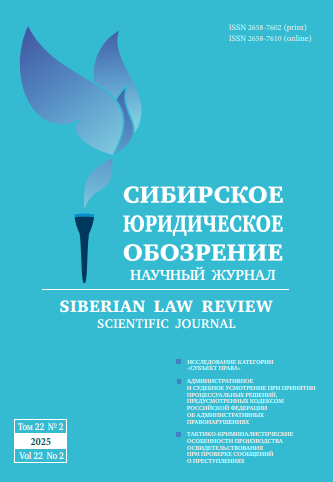Administrative and Judicial Discretion in Procedural Decision Making under the Code of Administrative Offenses of the Russian Federation
- Autores: Schepalov S.V.1,2
-
Afiliações:
- Supreme Court of the Republic of Karelia
- Kutafin Moscow State Law University
- Edição: Volume 22, Nº 2 (2025)
- Páginas: 257-270
- Seção: PUBLIC LEGAL (STATE LEGAL) SCIENCES
- ##submission.datePublished##: 07.07.2025
- URL: https://journal-vniispk.ru/2658-7602/article/view/343638
- DOI: https://doi.org/10.19073/2658-7602-2025-22-2-257-270
- EDN: https://elibrary.ru/EPEHPU
- ID: 343638
Citar
Texto integral
Resumo
This article continues the scholarly discussion initiated by Professors Yu. P. Solovey, P. P. Serkov, and S. A. Starostin on the issue of administrative discretion. Drawing on the theoretical framework proposed by Yu. P. Solovey, the Author compares administrative and judicial discretion in the context of Russian administrative jurisdiction, analyzing their respective functions, goals, subjects, and legal nature. As a result, the article proposes scientifically grounded definitions of both legal phenomena. The law does not, as a rule, provide enforcement authorities with a fully developed set of options for resolving a case. Consequently, a jurisdic-tional authority often cannot exercise discretion simply by choosing the “correct” option from a predefined list. Instead, the decision-making process is frequently complex, requiring not only analytical but also synthetic and creative approaches. In this context, the Author suggests using the broader term “decision-making” rather than simply “choice,” even while acknowledging the validity of defining discretion as a form of selection. Administrative discretion is understood as an instrument for achieving the goals of state policy and the execution of public authority. It focuses on implementing law in its narrow normative sense and involves compensating for legislative gaps by interpreting and applying the “spirit” of the law. By contrast, judicial discretion is oriented toward realizing universally recognized norms and societal values that express the broader priorities of the state. It represents law in its integrative sense – as a synthesis of fundamental social values and norms that reflect a societal consensus. Accordingly, the Author defines administrative discretion in administrative jurisdiction as the act of decision-making by an official in a case concerning an administrative offense, guided by their understanding of legal norms and values that correspond to the strategic priorities of public governance. Judicial discretion is defined as the act of a judge making a procedural decision based on their own understanding of widely accepted social norms within which the law is to be applied.
Sobre autores
Stanislav Schepalov
Supreme Court of the Republic of Karelia;Kutafin Moscow State Law University
Autor responsável pela correspondência
Email: schepalov@mail.ru
ORCID ID: 0009-0004-8835-247X
Judge of the Supreme Court of the Republic of Karelia;
Doctoral Candidate at the Kutafin Moscow State Law University, Candidate of Legal Sciences, Associate Professor
Rússia, 27 Kirova str., Petrozavodsk, 185035; 9 bldg. 1 Sadovaya-Kudrinskaya str., Moscow, 125993Bibliografia
- Starilov Yu. N. Has the Public Administration Renaissance Epoch Really Begun in Russia? On the Anniversary of Professor L. L. Popov. Administrative Law and Procedure. 2020;7:25-37. https://doi.org/10.18572/2071-1166-2020-7-25-37 (In Russ.)
- Rossinskiy B. V. L. L. Popov`s Scientific Views as a Public Administration Development Vector in Russia. Administrative Law and Procedure. 2020;7:37-42. https://doi.org/10.18572/2071-1166-2020-7-37-42 (In Russ.)
- Popov L. L. The Renaissance of Public Administration in Russia: Selected Works. Moscow: Norma Publ., INFRA-M Publ.; 2015. 366 p. (In Russ.)
- Zaitsev D. I. Administrative Discretion in the Digital Age. Courier of the Kutafin Moscow State Law University (MSAL). 2022;11:199-208. https://doi.org/10.17803/2311-5998.2022.99.11.199-208 (In Russ.)
- Barak A. Judicial Discretion. Moscow: Norma Publ.; 1999. 386 p. (In Russ.)
- Pokrovskii I. A. Key Issues in Civil Law. Moscow: Statut Publ.; 1998. 352 p. (In Russ.)
- Stepanov M. M. Judicial Discretion in the Activities of Local Courts in the Years of the Civil War in Russia (1918 to 1920). Russian Judge. 2022;3:47-51. https://doi.org/10.18572/1812-3791-2022-3-47-51 (In Russ.)
- Russkova M. A., Stepenko V. E. Subjects of Administrative Jurisdiction in Fishing and Preservation of Aquatic Biological Resources. Jurist. 2021;5:61-68. https://doi.org/10.18572/1812-3929-2021-5-61-68 (In Russ.)
- Emelyanov A.S. Functions of Financial Law and the Mechanism of Financial-Legal Regulation. Reformy i pravo. 2009;4:16-35. (In Russ.)
- Spiridonov L. I. Reflections on the State of Modern Legal Science (Extracts of the Classes with Post-Graduates of the Theory of Law). History of State and Law. 2009;24:14-21. (In Russ.)
- Leist O. E. Three Concepts of Law. Soviet State and Law. 1991;12:3-12. (In Russ.)
- Starostin S. A. On the Relation Between the Concepts of “Administrative Process”, “Administrative Proceedings”, “Administrative Procedures”. Courier of the Kutafin Moscow State Law University (MSAL). 2016;5:100- 106. (In Russ.)
- Palekha R. R. Integration Concept of Legal Understanding: Arguments in Favor. History of State and Law. 2009;21:38-41. (In Russ.)
- Martyshin O. V. Can the Main Types of Understanding of Law Be Compatible. State and Law. 2003;6:13-21. (In Russ.)
- Lizikova I. I. Conceptual Approaches to Definition of Law in Legal Science. History of State and Law. 2010;13:20-22. (In Russ.)
- Varlamova N. V. Russian Legal Theory in Search for a Paradigm. Journal of Russian Law. 2009;12:68-84. (In Russ.)
- Ershov V. V. Theoretical and Practical Problems of Law Understanding, Lawmaking and Enforcement. Rossijskoe Pravosudie. 2008;7:4-15. (In Russ.)
- Ershov V. V. The Status of Courts in a Rule-of-Law State. Moscow, 1992. 206 p. (In Russ.)
- Lyapunov Yu., Erasov A. Application of Articles of the Special Part of the Criminal Code of the Russian Federation Previously Providing for Confiscation of Property. Zakonnost. 2006;7:10-13. (In Russ.)
- Potapov V. D. Returning of the Cassation and Supervising Claims/Adductions Without Their Consideration in the Essence: the Bases and the Order. Criminal Law. 2012;2:97-101. (In Russ.)
- Sokolova E. S. The Principle of the Rule of Law in the Interpretation of Peter I: About Legal Basis for Modeling “Above-Class Monarchy” in Russia (First Quarter of XVIII Century). Russian Juridical Journal. 2013;4:78-81. (In Russ.)
- Kolyushin E. I. Values of Truth in Russian State (Constitutional) Law. Constitutional and Municipal Law. 2023;2:8-14. https://doi.org/10.18572/1812-3767-2023-2-8-14 (In Russ.)
- Malina M. A. Participation of the Population in Exercising Justice Can Radically Change Legal Consciousness of Russian Citizens. Russian Judge. 2022;2:51-55. https://doi.org/10.18572/1812-3791-2022-2-51-55 (In Russ.)
Arquivos suplementares












